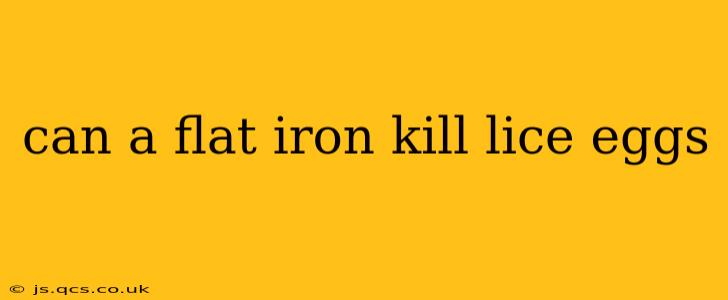Lice infestations are a common problem, especially among children. While various treatments exist, some people wonder if a seemingly simple solution like a flat iron can effectively kill lice eggs, also known as nits. The short answer is: potentially, but it's not a reliable or recommended method. Let's delve deeper into why.
How Effective is a Flat Iron Against Lice Eggs?
The high heat from a flat iron can kill lice eggs. The heat denatures the proteins in the nits, rendering them non-viable. However, there are significant challenges to this approach:
-
Uniform Heat Application: Achieving consistent, lethal heat across all nits is incredibly difficult. Hair density and thickness vary, making it nearly impossible to ensure every single nit receives the necessary heat for sufficient time to be killed. Some eggs might survive, leading to a continued infestation.
-
Risk of Hair Damage: Applying a hot flat iron directly to the scalp and hair for an extended period can cause significant damage, leading to breakage, burns, and other hair problems.
-
Difficult to Access: Nits are often tightly attached to the hair shaft, close to the scalp. Reaching and applying the flat iron effectively to every nit without causing discomfort or injury is extremely challenging.
-
Not a Complete Solution: Even if the heat successfully kills all eggs, it doesn't address the adult lice. These will need to be treated separately using appropriate methods.
What are the Best Methods for Removing Lice Eggs?
Instead of relying on a flat iron, which is risky and unreliable, there are proven and safer methods for removing lice and their eggs:
-
Fine-Toothed Comb: This is a crucial part of any lice treatment. A fine-toothed nit comb can physically remove nits from the hair shaft. It's essential to use conditioner to lubricate the hair, making combing easier and more effective.
-
Over-the-Counter (OTC) Treatments: Many effective OTC lice shampoos and lotions are available. These typically contain ingredients that kill lice and loosen nits. Always follow the instructions carefully.
-
Prescription Medications: If OTC treatments are ineffective, a doctor can prescribe stronger medications.
-
Professional Lice Removal: In some cases, professional lice removal services may be necessary. These services use specialized techniques and products to thoroughly eliminate lice and nits.
Are there any Home Remedies for Lice?
While several home remedies are touted as effective against lice, their efficacy is often not scientifically proven. Some may even be harmful. It's best to stick to proven methods and consult a healthcare professional for advice before trying any unproven remedies.
What are the Signs of a Lice Infestation?
Knowing the signs of a lice infestation is crucial for early detection and treatment. Look out for:
- Intense Itching: This is often the first sign.
- Small White Eggs (Nits): These are usually found close to the scalp.
- Live Lice: These are tiny, six-legged insects that move quickly.
If you suspect a lice infestation, seek professional advice and follow recommended treatment plans.
Can heat kill lice?
Yes, sufficient heat can kill both adult lice and their eggs. However, achieving this uniformly across the entire head of hair without causing damage is impractical. The flat iron method isn't a recommended approach.
How do I get rid of lice eggs naturally?
While some natural remedies are suggested, there is no universally agreed-upon naturally effective method for complete lice and nit removal. Focus on proven methods like combing with a fine-toothed comb and potentially using OTC treatments.
Is mayonnaise an effective lice treatment?
Mayonnaise is a popular home remedy, but scientific evidence supporting its effectiveness is lacking. While it might suffocate some lice, it's not a reliable method for complete eradication.
Remember, prevention is key. Regularly checking hair for lice and nits, especially in children, can help identify and treat infestations early. Always consult a healthcare professional for advice on lice treatment.
